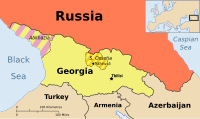Russian-occupied territories
This article is missing information about expanding articles to include more detail and the occupation of Transnistria.. (April 2021) |

 |
|---|
| Russo-Georgian War |
|---|
 |
| Main topics |
| Related topics |
|
|
Russian-occupied territories[1] is the collective name of the territories which have been designated as occupied under Russian military control by the governments of Georgia and Ukraine as well as the international community. The term "Russian-occupied territories" is used to denote Abkhazia, South Ossetia, Crimea and Donbass.
After 2008 South Ossetia war, on 26 August 2008, President Medvedev signed decrees recognising the independence of Abkhazia and South Ossetia as sovereign states. Russia established diplomatic relations with these partially recognised states and placed Russian troops in both Abkhazia and South Ossetia. Russian security forces were deployed along the demarcation lines with Georgia.
The Georgian parliament unanimously passed a resolution on August 28 2008 formally declaring Abkhazia and South Ossetia Russian-occupied territories, and calling Russian troops occupying forces. The law forbids entry into the regions from Russia and subjects violators to a fine or imprisonment. Entry into Abkhazia should be carried out from the Zugdidi District and into South Ossetia from the Gori District.[2]
In April of 2010, the Georgian parliament’s foreign affairs committee appealed to legislative bodies of 31 countries, asking to declare Georgia’s two regions Abkhazia and South Ossetia as territories under Russian occupation and to recognize that the massive displacement of civilians from those regions by Russia amounts to ethnic cleansing.[3] Russian Foreign Ministry has recently asked Georgia to abolish the law.[4]
After the Ukrainian crisis that erupted in 2014 following the Russian military intervention that resulted in Ukrainian control over the Crimean peninsula and parts of the Donetsk and Luhansk regions being lost, the situation regarding the Crimean peninsula is more complex since Russia annexed the territory in March 2014 and now administers it as two federal subjects - the Republic of Crimea and the federal city of Sevastopol. Ukraine continues to claim Crimea as an integral part of its territory, supported by most foreign governments and United Nations General Assembly Resolution 68/262,[5] although Russia and some other UN member states recognize Crimea as part of the Russian Federation, or have expressed support for the 2014 Crimean referendum.
In 2015 the Ukrainian parliament officially set 20 February 2014 as the date of "the beginning of the temporary occupation of Crimea and Sevastopol by Russia.",[6] [7] with 7% of Ukraine's territory under occupation.[8]
International media coverage
Many international journalists and media companies, such as Fox News, Al Jazeera, Radio Free Europe / Radio Liberty as well as non-governmental organizations have referred to Abkhazia and South Ossetia as Russian occupied territories.[9][10][11][12][13][14][15][16][17][18]
See also
- Abkhaz–Georgian conflict
- Georgian–Ossetian conflict
- Russo-Georgian War
- International reaction to the Russia–Georgia war
- International recognition of Abkhazia and South Ossetia
- Controversy over Abkhazian and South Ossetian independence
- Russo-Ukrainian War
- Annexation of Crimea by the Russian Federation
- War in Donbas
- Casualties of the Ukrainian crisis
- Cold War II
- Ukraine–European Union relations
- Ukraine–NATO relations
References
- ^ https://www.npr.org/2019/11/04/776193481/open-skies-new-start-pacts-with-russia-face-bleak-outlook
- ^ Abkhazia, S.Ossetia Formally Declared Occupied Territory. Civil Georgia. 2008-08-28.
- ^ Letter by Georgian Parliamentary Committee for Foreign Relations. Civil Georgia. 2010-04-08.
- ^ "Russia Urges Georgia to Scrap Occupied Territories Law". RIA Novosti. 2013-06-05.
- ^ "Kremlin: Crimea and Sevastopol are now part of Russia, not Ukraine". CNN. 18 March 2014.
- ^ (in Ukrainian) "Nasha" Poklonsky promises to the "Berkut" fighters to punish the participants of the Maidan, Segodnya (20 March 2016)
- ^ https://www.ukrweekly.com/uwwp/thoughts-on-the-russian-occupied-territories/
- ^ "Speakers Urge Peaceful Settlement to Conflict in Ukraine, Underline Support for Sovereignty, Territorial Integrity of Crimea, Donbas Region". United Nations. 20 February 2019. Retrieved 16 May 2019.
- ^ Luke Coffey (2012-08-31). "Four years later -- seeking a peaceful end to the Russian occupation". Fox News.
- ^ "Hopeful Georgia takes baby steps towards EU". Al Jazeera. 2013-11-30.
- ^ "Biden Says U.S. Will Not Recognize Abkhazia, South Ossetia". RFE/RL. 2013-02-02.
- ^ Ariela Shapiro (2013-07-13). "Normalized Georgia-Russia Relations May Contradict Georgia's Territorial Integrity". CACI Analyst.
- ^ "Luke Coffey, Georgia and Russia: The occupation too many have forgotten". 2010-06-01.
- ^ "Daniel Hamilton, Russia's occupation of Georgian territory must end". 2011-05-25.
- ^ Marcel de Haas. "NATO-Russia Relations after the Georgian Conflict" (PDF).
- ^ https://www.fdd.org/analysis/2020/07/22/occupied-territories-policy-amazon-crimea/
- ^ https://www.bbc.com/news/world-europe-56720589
- ^ https://ottawacitizen.com/opinion/belafi-how-far-will-canadas-and-the-wests-support-for-ukraine-go
- Russia stubs
- Ukraine stubs
- Georgia (country) stubs
- Georgia (country)
- Ukraine
- Russian-speaking countries and territories
- Separatism in Georgia (country)
- Autonomous republics of Georgia (country)
- Disputed territories in Europe
- Ukrainian crisis
- Conflicts in Ukraine
- 2010s in Ukraine
- 2010s conflicts
- Political history of Ukraine
- Post-Soviet conflicts

